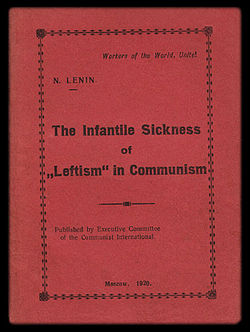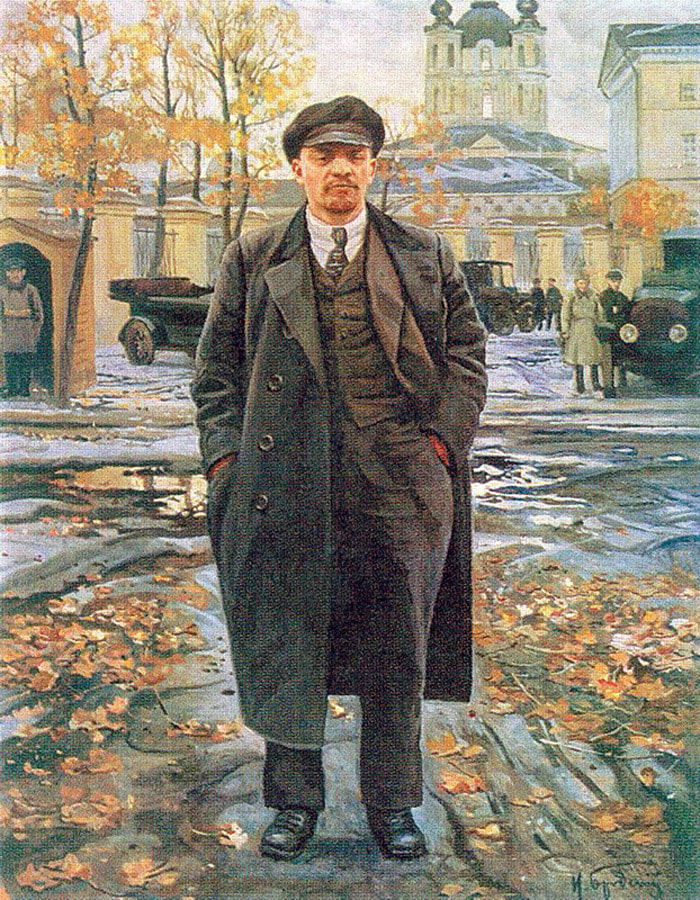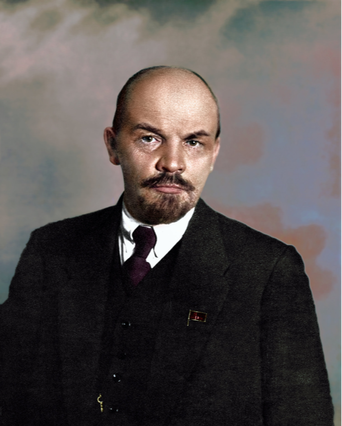|
6/20/2021 V. I. Lenin: ‘Left’ Wing Communism an Infantile Disorder — Commentary and Analysis. (9/10) By: Thomas RigginsRead NowCHAPTER NINE: Lenin on "Left-Wing" Communism in Great Britain.There was no Communist Party in Great Britain when Lenin wrote “’Left-Wing’ Communism an Infantile Disorder “[LWC] (the Communist Party of Great Britain was founded a few months later at the end of July 1920). Nevertheless, Lenin devoted chapter nine of the aforementioned book to discussing the problems of ultra-leftism in Britain. It is not my intention to rehash all the political fights of 1920 surrounding the formation of the CPGB discussed in LWC, instead I will highlight those insights from Lenin that pertain to general principles of Marxism and that are arguably relevant to the struggle for socialism in the early 21st century. Lenin begins this chapter with a discussion of an article written by Willie Gallacher (1881-1963) published in the "The Workers' Dreadnought" (a publication of one of the groups which were in the process of founding the CPGB) which was full enthusiasm for communism, the Russian Revolution, and the future of the working class in Britain. It also rejected cooperation with the Labour Party and working in the Parliament and the author did not want to cooperate with those who did. Lenin praised Gallacher's article [he later refers to it as "a letter to the editor"] for expressing the mood, or the temper, of the masses and explained it was just these type of young workers, represented by the author, who would be the future of socialism and who should be supported in all their efforts to build a revolutionary socialist party in Britain. Nevertheless, he does not want them to commit the same errors that the early Bolsheviks made, and that the German party made with respect to ultra-leftism. The future CPGB would be a formation composed of the coming together of at least four different socialist groups. To build a mass party it would be necessary to work with many other groups of workers at differing levels of class consciousness. Lenin stress that the CPGB, as should be the case with all Marxist parties, has to base its activities on SCIENTIFIC PRINCIPLES: and science, Lenin says, requires two things. First, a knowledge of what is happening in other countries, capitalist countries, and an analysis of the similarities and differences with your own country and how revolutionaries in those countries have coped with their own conditions. Second, a knowledge of your own country and ALL the groups, classes, parties, etc., and their positions and relationships. The policy adopted, in order to have the greatest number of supporters and best chance of winning, "should not be determined only by the desires and views, by the degree of class-consciousness and the militancy of one group or party alone." The focus of all this fuss about cooperating and compromising with the bourgeoisie was the Labour Party. The leaders of the Labour Party were considered by the radical workers as sell outs and "social patriots" who would govern in the interests of the capitalists not the workers whom they ostensibly represented and led. Lenin agrees with this and then states "it does not at all follow that to support them means treachery to the revolution; what does follow is that, in the interests of the revolution, working-class revolutionaries should give these gentlemen a certain amount of parliamentary support." But why does this follow? Why give support to false leaders who pose as progressives and really do the dirty work of the enemy? What can Lenin be thinking of? We must consider what was going on in Britain in the 1920s. The Labour Party was growing and the two main governing parties (the Liberals and the Conservatives) were beginning to panic. The Leader of the Liberals, Lloyd George, proposed a coalition with the Conservatives to stop the Labour Party. [Imagine a time in the US when the Republicans and Democrats unite to stop the Green Party!]. Meanwhile many Liberals are jumping ship and going over to the Labour Party. Lenin says that what is happening is that the liberal bourgeoisie is abandoning the traditional two party system by which the liberal and conservative capitalists alternate in ruling the government and exploiting the workers; a system "which has been hallowed by centuries of experience and has been extremely advantageous to the exploiters…." It is still the American system and the system in most capitalist “democracies.” The British leaders of the revolutionary workers, the very leaders of the future CPGB saw what was going on and even admitted the majority of workers were supporting the Labour Party saying, as did Sylvia Pankhurst (1882-1960) one of the founders of the CPGB, that "the majority of the British working class has not yet emerged" from the way of thinking represented by the Labour Party. It’s the Democratic party in the US today, despite the so-called “socialist moment.” Even knowing this she said: "The Communist Party must not compromise…. The Communist Party must keep its doctrine pure, and its independence of reformism inviolate: its mission is to lead the way, without stopping or turning, by the direct road to the communist revolution." Shades of Blanqui! [ “Blanquism refers to a conception of revolution generally attributed to Louis Auguste Blanqui (1805–1881) which holds that socialist revolution should be carried out by a relatively small group of highly organised and secretive conspirators. Having seized power, the revolutionaries would then use the power of the state to introduce socialism”—Wikipedia] Lenin is a firm believer that the working class learns by doing. If the workers believe in such a party or such and such an idea, which is wrong and will not emancipate them, they must go through the experience of living and working with these false ideas until they learn from experience that they must abandon these wrong approaches. Meanwhile the revolutionary Marxists will have been working along with the workers and supporting their efforts but also explaining why their views will not succeed and why Marxism provides a better alternative. This is the only way to win over the working people to the revolutionary Marxist point of view. This is why we must work in the reactionary institutions of the bourgeoisie. "To act otherwise would mean hampering the cause of the revolution, since revolution is impossible without a change in the views of the majority of the working class, a change brought about by the political experience of the masses, never by propaganda alone." [Revisionist parties work with these other groups but for the sake of “unity” don’t stress the Marxist point of view as a corrective to their limited understanding of the class struggle.] We come now to Lenin's famous formulation of “The Fundamental Law of Revolution”. Lenin says this law applies to all revolutions which means many of the revolts, insurrections, and coups that historians like to call "revolutions" are not revolutions at all. The Law states: "for a revolution to take place it is not enough for exploited and oppressed masses to realize the impossibility of living in the old way, and demand changes; for a revolution it is essential that the exploiters should not be able to live and rule in the old way. It is only when the "LOWER CLASSES" DO NOT WANT to live in the old way and the "upper classes" CANNOT CARRY ON IN THE OLD WAY that the revolution can triumph." Two obvious conclusions Lenin draws, with respect to an anti-capitalist revolution, are, first, the majority of the working class (or at a minimum the majority of the politically active class conscious workers [this is "iffy" a majority of these may still be too small]) must fully understand the need for a revolution and be willing to take up arms if necessary to carry it out; second, the government of the ruling class must be undergoing a crisis which brings the masses of people, even those "hitherto apathetic," into a movement that so weakens it (the government) that the revolutionary elements can "rapidly overthrow it". The revolution will not be a tea party. Lenin thought the two conditions mentioned above were fast developing in Great Britain, but they did not in fact come about. Nevertheless, Lenin's advice in general as to how the Marxists in Great Britain should behave still makes sense even in our own day, and it is not restricted to any particular country. Briefly he says that unless we want to risk being seen as "mere wind bags" and a party that represents only a group and not the masses of the revolutionary working class ["revolutionary" is the key word to understand in this context] we must get the MASSES to follow our party. To do this we must help the working class achieve the maximum of class consciousness and this means working in the political world in which we and they find ourselves and helping them to understand, by their own experiences, that no solutions of bourgeois politics can solve their problems and the only way forward for their class is by supporting a revolutionary Marxist party. How would this practically be done? Extrapolating from the conditions of Lenin's day to the present time, and using the experience of US elections, I suggest the following edited comment from Lenin: We would take part in the election campaigns, we would hand out leaflets in favor of Marxism and explaining what's wrong with capitalism, and where we are not running our own candidates we would urge support for the candidate most favorable to the workers and who had the most support from the progressive union movement and we would urge the defeat of all reactionary, ultra-right and anti-labor, anti-progressive candidates. Lenin's actual advice to the British Marxists was: "We would take part in the election campaign, distribute leaflets agitating for communism, and in ALL constituencies where we have no candidates, we would urge the electors TO VOTE FOR THE LABOUR CANDIDATE AND AGAINST THE BOURGEOIS CANDIDATE." Others may have a better revision of this quote than what I have proposed above, but I have tried to factor in specifically US conditions (both major parties are bourgeois, the ultra-right poses a clear and present danger, the labor movement is under attack, among others). As Lenin maintained that each country had an unique historical configuration of its own regarding the class struggle and the relations between the classes and parties making it up, it was therefore the task of Marxists to learn "to apply the general and basic principles" of Marxism to their own situation in order to "study, discover, and predict" the proper course of action. It is with this conclusion that he ends this chapter of LWC. Up Next: CHAPTER TEN: “Lessons and Conclusions from Lenin's "Left-Wing" Communism an Infantile Disorder” AuthorThomas Riggins is a retired philosophy teacher (NYU, The New School of Social Research, among others) who received a PhD from the CUNY Graduate Center (1983). He has been active in the civil rights and peace movements since the 1960s when he was chairman of the Young People's Socialist League at Florida State University and also worked for CORE in voter registration in north Florida (Leon County). He has written for many online publications such as People's World and Political Affairs where he was an associate editor. He also served on the board of the Bertrand Russell Society and was president of the Corliss Lamont chapter in New York City of the American Humanist Association.
0 Comments
Leave a Reply. |



 RSS Feed
RSS Feed